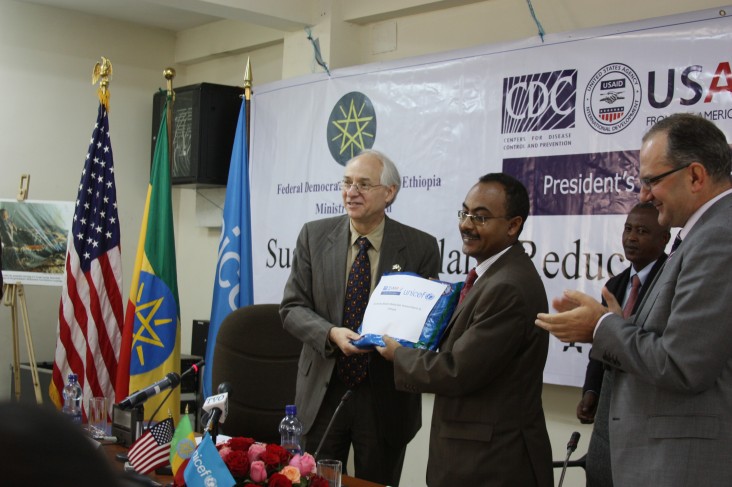
Nets, medicine, and diagnostic tests to benefit 22 million Ethiopians in high risk areas
For Immediate Release
Addis Ababa: Today, a five-year, $100 million grant agreement was signed by the Ministry of Health of the Federal Democratic Republic of Ethiopia, the U.S. President’s Malaria Initiative (PMI) and UNICEF, at the premises of the Federal Ministry of Health (FMoH). H.E. Dr. Kesetebirhan Admasu, Minister of Health, H.E. Donald E. Booth, U.S. Ambassador to Ethiopia, and Dr. Peter Salama, UNICEF Representative to Ethiopia, signed the new agreement to redouble efforts to prevent and control malaria in Ethiopia, notably in the most affected Oromia Region.
The grant from the United States to UNICEF supports Ethiopia’s National Strategic Plan for Malaria Prevention, Control and Elimination (2011-2015) through the provision of life saving antimalarial drugs, diagnostic kits, and long lasting insecticide treated nets. This support will also help complete the national roll-out of integrated community case management of common childhood illnesses (ICCM). The services will be delivered through Ethiopia’s Health Extension Program (HEP).
Key interventions include the procurement and distribution of 11 million long lasting insecticide treated nets, which will protect 22 million people living in malaria risk areas, procurement of 12.6 million courses of Artemisinin Combination Therapies (ACT) for treatment, and 16.5 million multi-species Rapid Diagnostic Tests and other anti-malarial drugs. In addition, PMI, UNICEF, and the FMoH will continue to support improved national planning for malaria commodities.
Following the signing of the grant Dr. Kesetebirhan Admasu, Minister of Health emphasised the importance of the grant: “People know that you can die if you do not treat malaria, but importantly, malaria unnecessarily taxes our population by causing avoidable illness and loss of productivity and limiting our overall economic potential under the Growth and Transformation Plan. Fighting malaria is a critical investment and we are grateful to our partners the United States Government and UNICEF for helping reduce the number of deaths and illness related to malaria in our country.”
Ambassador Booth said, “Ethiopia is a priority country for the U.S. President’s Malaria Initiative. Ethiopia has made praiseworthy progress in the fight against malaria and has demonstrated that it has the potential to eliminate it, so that no child, no family, and no community must suffer the debilitating consequences of this disease. Malaria is one of the leading causes of death of children under 5—and every child deserves to live to see their fifth birthday and many more.”
“Ethiopia has made tremendous progress in the health sector and is now on track to reach the child survival Millennium Development Goal,” said Dr. Salama. “With the signing of this significant grant and the on-going collaboration between the Government of Ethiopia, the United States and UNICEF, I have no doubt Ethiopia will continue to be a model of progress in mother and child health for other countries,” he added.
See Also
-
PMI-UNICEF Grant Press Release, English [PDF, 78 KB]
-
PMI-UNICEF Grant Press Release, Amharic [PDF, 101 KB]
-
Remarks by U.S. Ambassador Donald Booth [PDF, 191 KB]
-
Remarks by UNICEF Country Representative to Ethiopia Dr. Peter Salama [PDF, 109 KB]







Comment
Make a general inquiry or suggest an improvement.